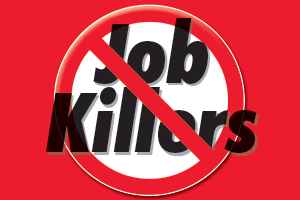As the 2017 legislative session came to a close early Saturday morning, 24 of 27 identified job killer bills had been effectively stopped through efforts of the California Chamber of Commerce, local chambers and the business community.
Many job killer bills were the focus of rigorous debate and controversy; in fact, two new job killers were identified last week as a result of amendments added when the bills were being considered on the house floors.
Below is a recap on the highest profile job killer bills that were still active in the last two weeks of the session.
To Governor; Action Needed
Three job killers are on the governor’s desk. The CalChamber is urging its members to contact Governor Brown and ask him to veto AB 1209, SB 33, SB 63.
Below is a summary of each bill:
• AB 1209 (Gonzalez Fletcher; D-San Diego) Public Shaming of Employers — Imposes new data collection mandate on California employers to collect and report data to the Secretary of State regarding the mean and median salaries of men and women in the same job title and job description, determine which employees perform “substantially similar” work, and then have that report posted on a publicly accessible website, where such employers will receive undue scrutiny and criticism for wage disparity that is not unlawful and justified by a bona fide factor.
• SB 33 (Dodd; D-Napa) Discrimination Against Arbitration Agreements — Unfairly discriminates against arbitration agreements contained in consumer contracts for goods or services with a financial institution, as broadly defined, which is likely preempted by the Federal Arbitration Act and will lead to confusion and unnecessary litigation.
• SB 63 (Jackson; D-Santa Barbara) Imposes New Maternity and Paternity Leave Mandate — Unduly burdens and increases costs of small employers with as few as 20 employees by requiring 12 weeks of protected employee leave for child bonding and exposes them to the threat of costly litigation.
Job Killers Stopped
AB 127 (Committee on Budget) was identified as a job killer on September 13 when language was added to a budget bill that threatened energy reliability by mandating the closure of the Aliso Canyon natural gas storage facility. CalChamber had identified AB 127 as a job killer because it would have eliminated jobs and placed regional energy reliability at risk. The bill was never taken up for a vote on the Senate Floor.
SB 49 (de León; D-Los Angeles), which would have created uncertainty and increased potential litigation regarding environmental standards, was held in the Senate Rules Committee. The bill would have given broad and sweeping discretion to state agencies to adopt rules and regulations more stringent than the federal rules. SB 49 would have increased the potential for costly litigation by creating private rights of action under California law, which may be triggered when a state agency takes the foregoing discretionary action.
Finally, a job killer bill that would have increased permitting fees and delayed permitting, SB 774 (Leyva; D-Chino), was held on the Assembly Floor inactive file, just days after being amended with onerous provisions. It would established the California Toxic Substances Board within the Department of Toxic Substances Control (DTSC), requiring DTSC to adopt a new fee schedule by January 1, 2019 “at a rate sufficient to reimburse the department’s costs to implement” its statutory requirements.
SB 774 was tagged as a job killer because it bypassed public participation and input and would have allowed DTSC to adopt future fee schedules as “emergency” regulations when such regulations would have had significant impacts on permittees’ ability to continue to provide vital services to California communities.
Cumulative Job Killer Vetoes
2017: 27 job killers identified, 3 sent to Governor Brown;
2016: 24 job killers identified, 5 sent to Governor Brown, 4 signed, and 1 vetoed;
2015: 19 job killer bills identified, 3 sent to Governor Brown, 1 signed, and 2 vetoed;
2014: 27 job killer bills identified, 2 sent to Governor, signs 2;
2013: 38 job killer bills identified, 1 sent to Governor, signs 1;
2012: 32 job killer bills identified, 6 sent to Governor, 2 vetoed;
2011: 30 job killer bills identified, 5 sent to Governor, 4 vetoed;
2010: 43 job killer bills identified, 12 sent to Governor, 10 vetoed;
2009: 33 job killer bills identified, 6 sent to Governor, 6 vetoed;
2008: 39 job killer bills identified, 10 sent to Governor, 9 vetoed;
2007: 30 job killer bills identified, 12 sent to Governor, 12 vetoed;
2006: 40 job killer bills identified, 11 sent to Governor, 9 vetoed;
2005: 45 job killer bills identified, 8 sent to Governor, 7 vetoed;
2004: 23 job killer bills identified, 10 sent to Governor, 10 vetoed;
2003: 53 job killer bills identified, 13 sent to Governor, 2 vetoed;
2002: 35 job killer bills identified, 17 sent to Governor, 5 vetoed;
2001: 12 job killer bills identified, 5 sent to Governor, 2 vetoed;
2000: No job killers identified. Of 4 bad bills identified at end of session, Governor Davis signs 2 and vetoes 2;
1999: 30 job killer bills identified, 9 sent to Governor, 3 vetoed;
1998: 64 job killer bills identified, 11 sent to Governor, 11 vetoed.;
1997: 57 job killer bills identified, 9 sent to Governor, 9 vetoed.


